Alexandre Maraval
Large Language Models Orchestrating Structured Reasoning Achieve Kaggle Grandmaster Level
Nov 05, 2024



Abstract:We introduce Agent K v1.0, an end-to-end autonomous data science agent designed to automate, optimise, and generalise across diverse data science tasks. Fully automated, Agent K v1.0 manages the entire data science life cycle by learning from experience. It leverages a highly flexible structured reasoning framework to enable it to dynamically process memory in a nested structure, effectively learning from accumulated experience stored to handle complex reasoning tasks. It optimises long- and short-term memory by selectively storing and retrieving key information, guiding future decisions based on environmental rewards. This iterative approach allows it to refine decisions without fine-tuning or backpropagation, achieving continuous improvement through experiential learning. We evaluate our agent's apabilities using Kaggle competitions as a case study. Following a fully automated protocol, Agent K v1.0 systematically addresses complex and multimodal data science tasks, employing Bayesian optimisation for hyperparameter tuning and feature engineering. Our new evaluation framework rigorously assesses Agent K v1.0's end-to-end capabilities to generate and send submissions starting from a Kaggle competition URL. Results demonstrate that Agent K v1.0 achieves a 92.5\% success rate across tasks, spanning tabular, computer vision, NLP, and multimodal domains. When benchmarking against 5,856 human Kaggle competitors by calculating Elo-MMR scores for each, Agent K v1.0 ranks in the top 38\%, demonstrating an overall skill level comparable to Expert-level users. Notably, its Elo-MMR score falls between the first and third quartiles of scores achieved by human Grandmasters. Furthermore, our results indicate that Agent K v1.0 has reached a performance level equivalent to Kaggle Grandmaster, with a record of 6 gold, 3 silver, and 7 bronze medals, as defined by Kaggle's progression system.
End-to-End Meta-Bayesian Optimisation with Transformer Neural Processes
May 25, 2023

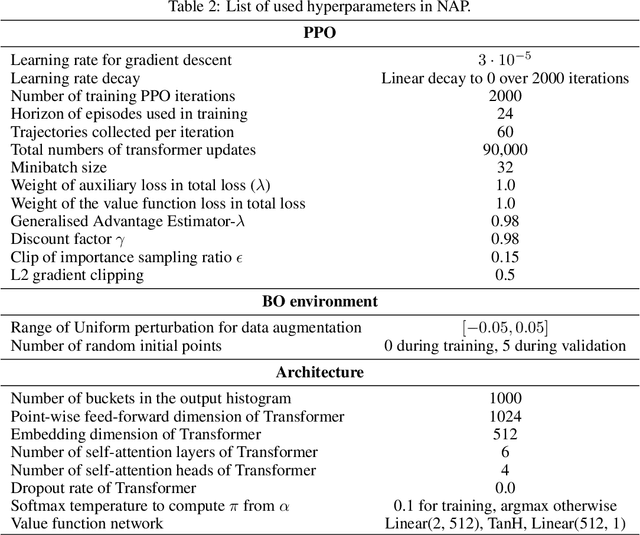
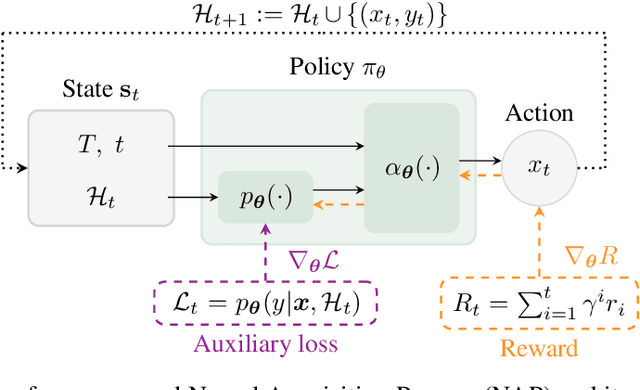
Abstract:Meta-Bayesian optimisation (meta-BO) aims to improve the sample efficiency of Bayesian optimisation by leveraging data from related tasks. While previous methods successfully meta-learn either a surrogate model or an acquisition function independently, joint training of both components remains an open challenge. This paper proposes the first end-to-end differentiable meta-BO framework that generalises neural processes to learn acquisition functions via transformer architectures. We enable this end-to-end framework with reinforcement learning (RL) to tackle the lack of labelled acquisition data. Early on, we notice that training transformer-based neural processes from scratch with RL is challenging due to insufficient supervision, especially when rewards are sparse. We formalise this claim with a combinatorial analysis showing that the widely used notion of regret as a reward signal exhibits a logarithmic sparsity pattern in trajectory lengths. To tackle this problem, we augment the RL objective with an auxiliary task that guides part of the architecture to learn a valid probabilistic model as an inductive bias. We demonstrate that our method achieves state-of-the-art regret results against various baselines in experiments on standard hyperparameter optimisation tasks and also outperforms others in the real-world problems of mixed-integer programming tuning, antibody design, and logic synthesis for electronic design automation.
Sample-Efficient Optimisation with Probabilistic Transformer Surrogates
May 30, 2022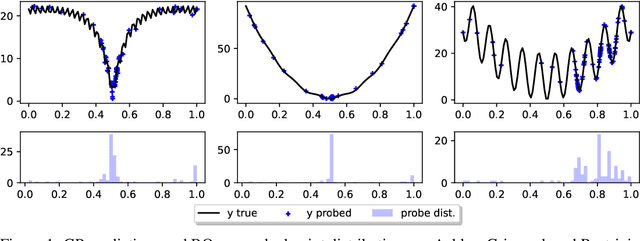


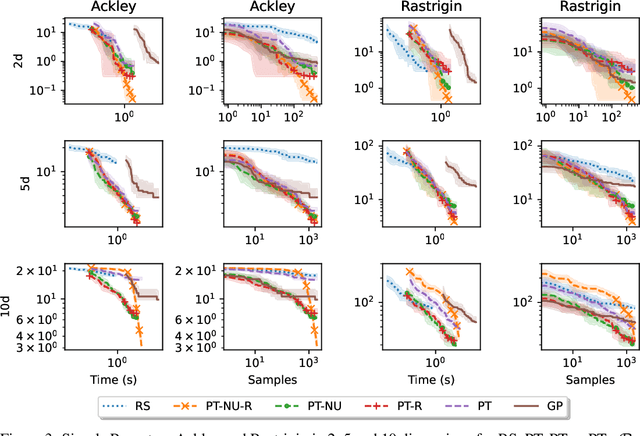
Abstract:Faced with problems of increasing complexity, recent research in Bayesian Optimisation (BO) has focused on adapting deep probabilistic models as flexible alternatives to Gaussian Processes (GPs). In a similar vein, this paper investigates the feasibility of employing state-of-the-art probabilistic transformers in BO. Upon further investigation, we observe two drawbacks stemming from their training procedure and loss definition, hindering their direct deployment as proxies in black-box optimisation. First, we notice that these models are trained on uniformly distributed inputs, which impairs predictive accuracy on non-uniform data - a setting arising from any typical BO loop due to exploration-exploitation trade-offs. Second, we realise that training losses (e.g., cross-entropy) only asymptotically guarantee accurate posterior approximations, i.e., after arriving at the global optimum, which generally cannot be ensured. At the stationary points of the loss function, however, we observe a degradation in predictive performance especially in exploratory regions of the input space. To tackle these shortcomings we introduce two components: 1) a BO-tailored training prior supporting non-uniformly distributed points, and 2) a novel approximate posterior regulariser trading-off accuracy and input sensitivity to filter favourable stationary points for improved predictive performance. In a large panel of experiments, we demonstrate, for the first time, that one transformer pre-trained on data sampled from random GP priors produces competitive results on 16 benchmark black-boxes compared to GP-based BO. Since our model is only pre-trained once and used in all tasks without any retraining and/or fine-tuning, we report an order of magnitude time-reduction, while matching and sometimes outperforming GPs.
Efficient Semi-Implicit Variational Inference
Jan 15, 2021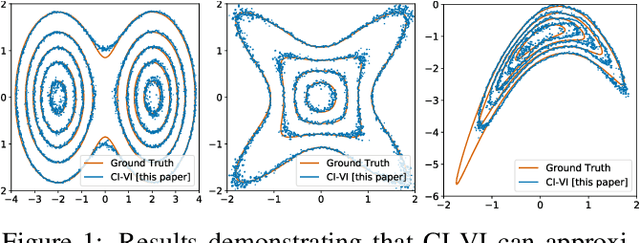

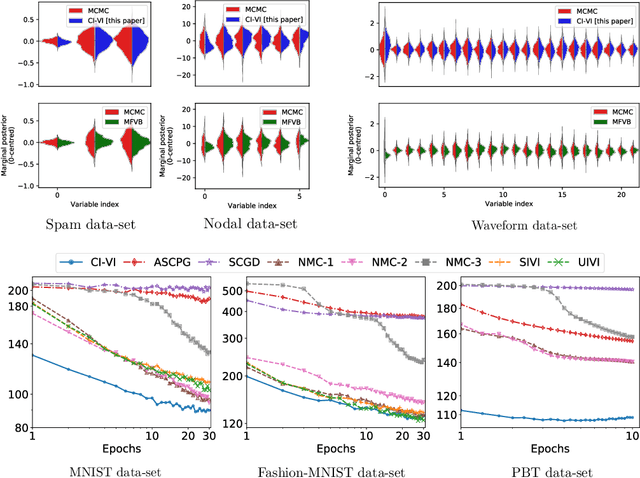
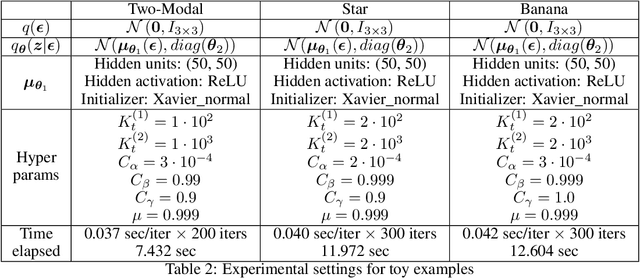
Abstract:In this paper, we propose CI-VI an efficient and scalable solver for semi-implicit variational inference (SIVI). Our method, first, maps SIVI's evidence lower bound (ELBO) to a form involving a nonlinear functional nesting of expected values and then develops a rigorous optimiser capable of correctly handling bias inherent to nonlinear nested expectations using an extrapolation-smoothing mechanism coupled with gradient sketching. Our theoretical results demonstrate convergence to a stationary point of the ELBO in general non-convex settings typically arising when using deep network models and an order of $O(t^{-\frac{4}{5}})$ gradient-bias-vanishing rate. We believe these results generalise beyond the specific nesting arising from SIVI to other forms. Finally, in a set of experiments, we demonstrate the effectiveness of our algorithm in approximating complex posteriors on various data-sets including those from natural language processing.
 Add to Chrome
Add to Chrome Add to Firefox
Add to Firefox Add to Edge
Add to Edge